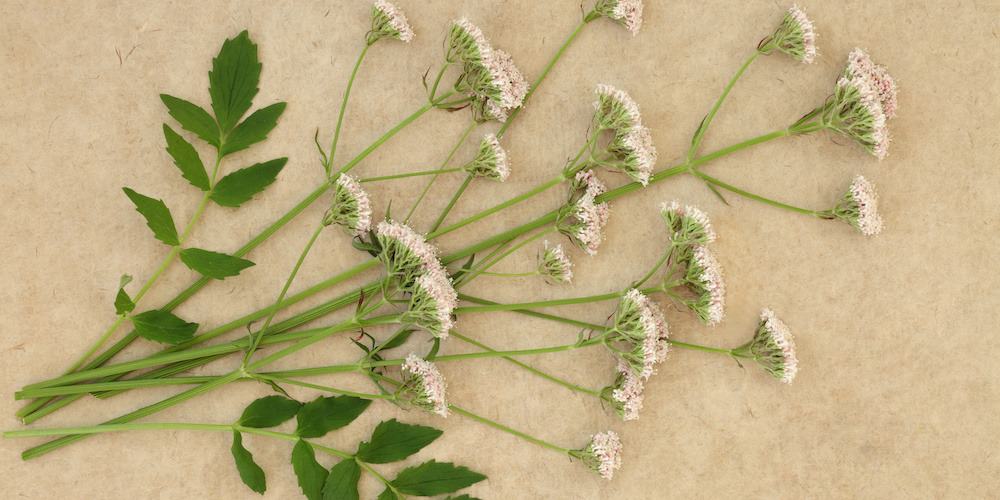BENEFITS OF VALERIAN
✓ Relieves stress and behavioral disorders
✓ Combats depression
✓ Improves sleep quality
✓ Relieves pain
✓ Supports the cardiovascular system
What is valerian?
The scientific name for valerian is Valeriana officinalis, derived from the Latin “valere,” which means “to be well.” Over the centuries, it has been known as Saint George’s Herb, Bruised Herb, Heal-All, or Cat Herb due to its attraction to cats.
Valerian belongs to the Caprifoliaceae family and originates from Europe and Asia. It grows in temperate climates in clay-siliceous, cool, and moist soils. The plant can reach up to 1.50 meters in height and has serrated leaves. From May to August, valerian produces pale pink flowers that are popular with pollinating insects. It then yields fruits called achenes, equipped with small plumes.
However, in herbal medicine, it is mainly the rhizomatous roots of valerian that are of interest. This is indeed where the active compounds of the plant are found.
A multitude of roots develop and wrap around the main rhizome. They are then harvested in September-October, after flowering, when the active content is at its highest.
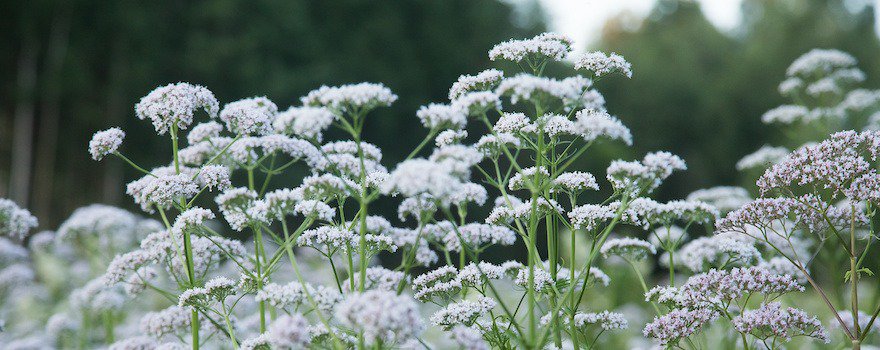
Valerian has been known and used since Antiquity. It was recommended for treating insomnia, fighting heart palpitations, relieving depression and fears. Despite its bitter taste, it was most often consumed as a decoction or tea. In 1942, valerian was used during the Second World War to address the shortage of medications. Eserine was then replaced with medicinal plants, including the one of interest here.
From the 20th century onwards, research on valerian proliferated. Scientists identified numerous active compounds and highlighted the sedative, relaxing, and calming action of the plant.
Today, it is mainly consumed as a dietary supplement, in the form of tablets, capsules, powder, or mother tincture. Valerian root most often comes from Europe, which produces 1200 tons of dry roots per year.
Read also | How to choose the best natural anti-stress
Nutitional Composition
- Amino acids: tyrosine, glutamine
- Alkaloids: valerine, chatinine
- Terpenic acids: valeric acid, isovaleric acid, hydroxyvaleric acid
- Valepotriates: iridoids
- GABA (γ-aminobutyric acid)
- Flavonoids
- Tannins
- Essential oils: bornyl acetate, beta-caryophyllene
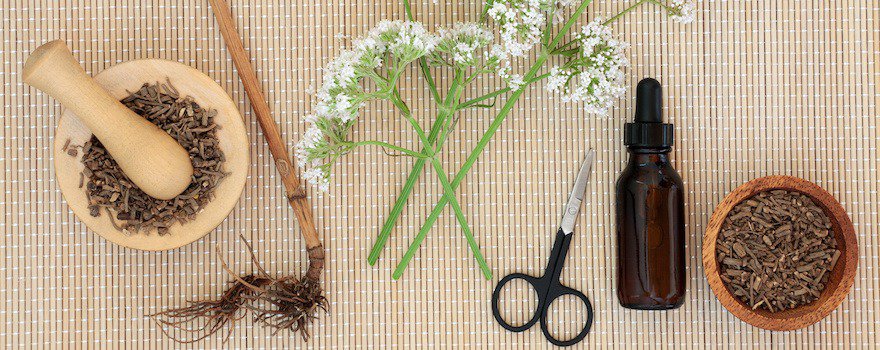
Benefits
🙏 Relieves stress and behavioral disorders
In herbal medicine, valerian is recommended for its calming effect on the nervous system. It is valuable for fighting stress (transient or chronic), anxiety, fears, and worries.
Generally, it reduces behavioral disorders such as nervous agitation, paranoia, or Obsessive-Compulsive Disorders (OCD).
The calming effect of valerian is due to the terpenic acids and γ-aminobutyric acid (or GABA) contained in its root. Both have an anti-stress, sedative, and relaxing effect. GABA is an inhibitory neurotransmitter that plays a role in calming brain activity and maintaining the balance of the nervous system.
This study by the University of Zurich, conducted on mice, shows how valeric acid in valerian acts on GABA receptors. In another study by the Jundishapur University of Medical Sciences, conducted on adults with OCD, valerian extract significantly improved symptoms compared to placebo.
🧘🏻♀️ Combats depression
Valerian helps regain mental balance and zest for life, alleviating feelings of sadness and melancholy. This anti-depressive property is, once again, due to the valerenic acid and GABA present in its roots.
The active compounds in valerian notably increase the level of 5-hydroxytryptamine (5-HT), more commonly known as serotonin or the “happiness hormone“. Serotonin, derived from the amino acid tryptophan, affects mood and has a significant influence on depressive syndrome. In this respect, the effects of valerian are similar to those of raw cacao, rhodiola, or griffonia.
Moreover, it preserves neurons at the hippocampus level, a region of the brain affected by chronic depression. Indeed, repeated depressive episodes can damage the brain by causing hippocampal shrinkage and neuronal loss. Yet, the hippocampus plays an important role in emotional balance.
This study from Sun Yat-sen University in Guangzhou, China, conducted on rats, shows how valerian affects 5-hydroxytryptamine levels and preserves hippocampal neurons.
😴 Improves Sleep Quality
Along with passionflower, hawthorn, and lemon balm, valerian is one of the essential plants for improving sleep quality. By reducing stress, relieving nervous agitation, and calming thoughts, it promotes falling asleep. It reduces the time needed to fall asleep due to its sedative effect and action on GABA.
But the plant also affects sleep quality. It promotes deep and restorative sleep and restores the balance of sleep cycles. Finally, valerian combats sleep disorders: insomnia, nighttime awakenings… Just like another Indian plant, ashwagandha!
This study from the University of California, conducted on patients suffering from insomnia, shows that valerian induced improved sleep compared to a placebo.
💆♂️ Relieves Pain
Valerian has an analgesic and antispasmodic action. It relieves pain and discomfort associated with muscle contractions, menstrual cramps, and nerve-origin gastrointestinal spasms…
Thus, it is an analgesic plant, just like boswellia.
In this study from the Shiraz University of Medical Sciences in Iran, conducted on rats, valerian root extract, combined with turnip extract, showed analgesic effects in both acute and chronic phases of pain.
❤️ Supports Cardiovascular System
Valerian is a plant ally for the cardiovascular system. On one hand, it protects the heart and prevents heart diseases by promoting blood circulation and lowering blood pressure. Hypertension is one of the main risk factors for heart diseases.
On the other hand, its actives support cardiac function by regulating heart rate. Thus, they combat palpitations and tachycardia.
In this study from the Chinese Academy of Medical Sciences in Beijing, conducted on rats, researchers studied the components and cardiovascular activity of valerian.
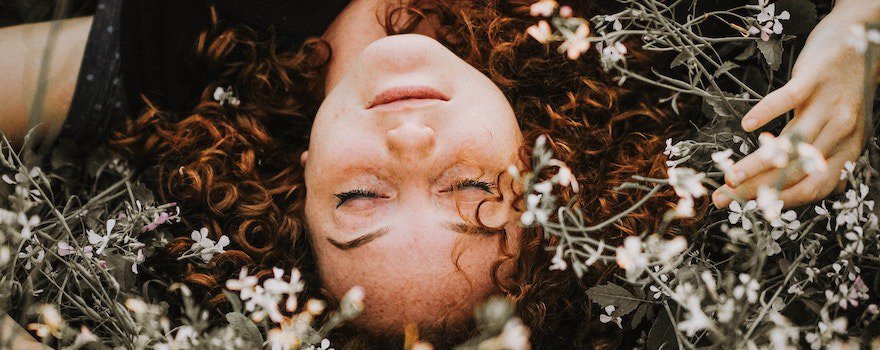
How to Consume Valerian?
In Tablet Form
Tablets or capsules contain valerian root powder, previously dried and ground (preferably cold). This is the easiest form to find in pharmacies, organic and specialized stores, or online.
To avoid pesticide residues, it is preferable to choose organic valerian.
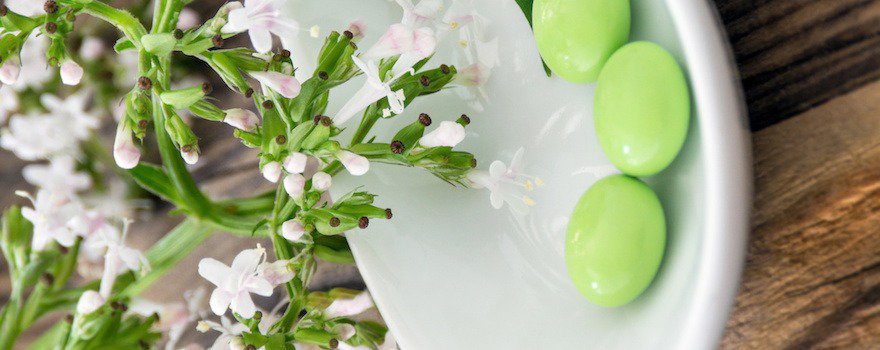
In Powder Form
It can also be found in powder form, obtained from the dried root and then ground into powder. Valerian powder is simply mixed in a glass of water or prepared as an infusion.
But valerian tea is quite bitter. To sweeten the taste, you can add a spoonful of honey.
In mother tincture form
Valerian is also available as a mother tincture or hydroalcoholic extract. Derived from fresh roots, the mother tincture is rich in active ingredients. However, this format contains a lot of alcohol. Therefore, mother tincture is not recommended for young children, pregnant or breastfeeding women.
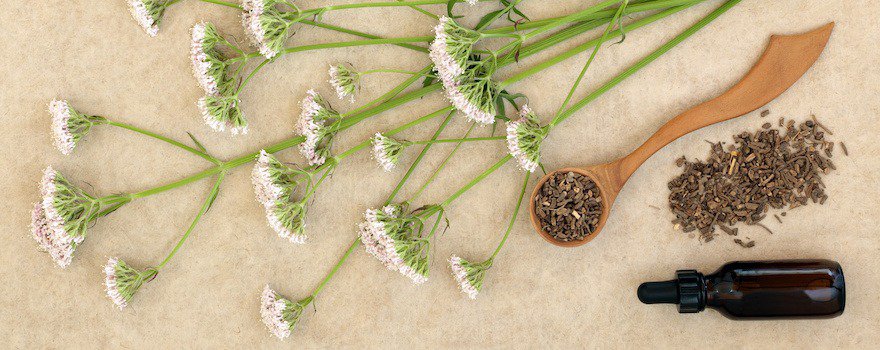
Valerian and medicinal plants
Valerian is a plant that pairs well with other medicinal plants. To combat depression and improve sleep quality, the valerian/griffonia combination is interesting. Griffonia is a plant that contributes to mental well-being. It reduces stress, alleviates depression and its symptoms, and restores and improves sleep.
The consumption of valerian can also be complemented with the intake of rhodiola, an anti-depressant and strengthening flower, or ashwagandha, one of the most powerful natural anti-stress agents.
Dosage
⚖️ The recommended dosage of valerian varies between 500 and 600 mg per day.
⌛️ The doses should be divided into 3 times throughout the day, with one dose taken 2 hours before bedtime. The first results are felt after 2 weeks or more.
⌛️ To deeply affect sleep and depression, it is possible to undergo a 1 to 3-month treatment, with a break of one week every two weeks. Consult your doctor before starting a valerian treatment.
💊 In tablet form: up to 3 per day for tablets or capsules of 200 mg
🥄 In powder form: 1 level teaspoon per day (about 1 g)
🧪 In mother tincture: 3 x 20 to 30 drops per day or 50 drops 2 hours before bedtime
Contraindications and side effects
As long as the recommended dose is not exceeded, valerian is well tolerated by the body. It has few contraindications, but its use is not recommended for the following individuals:
- As a precaution, young children and pregnant or breastfeeding women should avoid taking it.
- Individuals under medical treatment (hypnotics, anxiolytics, sleeping pills, and psychotropic drugs) should seek medical advice before consuming it.
- Valerian should not be used in cases of liver disease.
Its consumption may cause certain side effects, which are mostly mild. The following undesirable effects have been reported:
- Drowsiness and dizziness.
- Headaches.
- Stomachaches.
- Nausea.
- Insomnia and restlessness.
Due to possible drowsiness effects, it is not recommended to consume valerian before driving or operating dangerous tools.
History, culture, and market
Valerian through the ages
Valerian had its moment of glory during Antiquity, among both Greeks and Romans. Thus, the famous Greek physician Hippocrates recommended valerian for treating insomnia. In Rome, it was used to relieve heart palpitations or gynecological problems.
It appears in numerous ancient texts on medicinal plants. It is notably found in Matthaeus Platearius’ “Circa instans” (12th century) and in Albertus Magnus’s “De Vegetabilibus ” (13th century), one of the greatest plant encyclopedias.
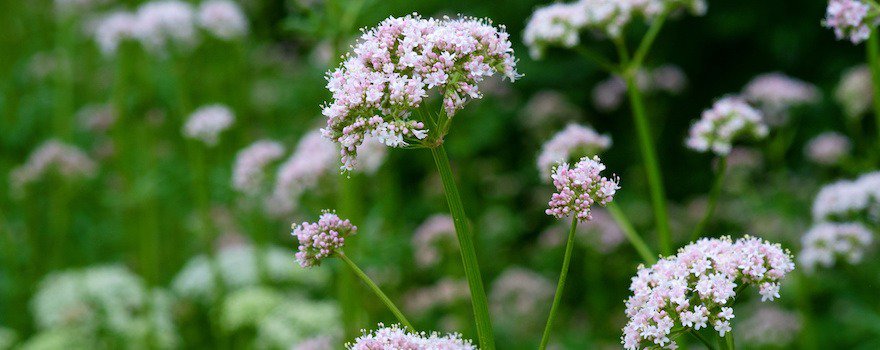
An irresistible plant for cats
Also known as Cat’s Herb, valerian emits a strong smell that attracts felines. And for a good reason: it is similar to the smell of cat urine.
This unpleasant odor is due to the presence of actinidine, a pheromone that enables communication between insects (like ants, for example) and is especially attractive to cats. It has an intoxicating but safe effect. That’s why cats love to rub against valerian leaves!
Report by Julia Perez and Charlotte Jean
Sources and scientific studies
Benke D, Barberis A, Kopp S, Altmann KH, Schubiger M, Vogt KE, Rudolph U, Möhler H, 2009. GABA A receptors as in vivo substrate for the anxiolytic action of valerenic acid, a major constituent of valerian root extracts.
Tang JY, Zeng YS, Chen QG, Qin YJ, Chen SJ, Zhong ZQ, 2008. Effects of Valerian on the level of 5-hydroxytryptamine, cell proliferation and neurons in cerebral hippocampus of rats with depression induced by chronic mild stress.
Stephen Bent, Amy Padula, Dan Moore, Michael Patterson, Wolf Mehling, 2006. Valerian for Sleep: A Systematic Review and Meta-Analysis.
Zare A, Khaksar Z, Sobhani Z, Amini M, 2018. Analgesic Effect of Valerian Root and Turnip Extracts.
Heng-Wen Chen, Ben-Jun Wei, Xuan-Hui He, Yan Liu, Jie Wang, 2015. Chemical Components and Cardiovascular Activities of Valeriana spp.
Photos: Adobe Stock. Rodolfo Sanches Carvalho/ Unsplash.


